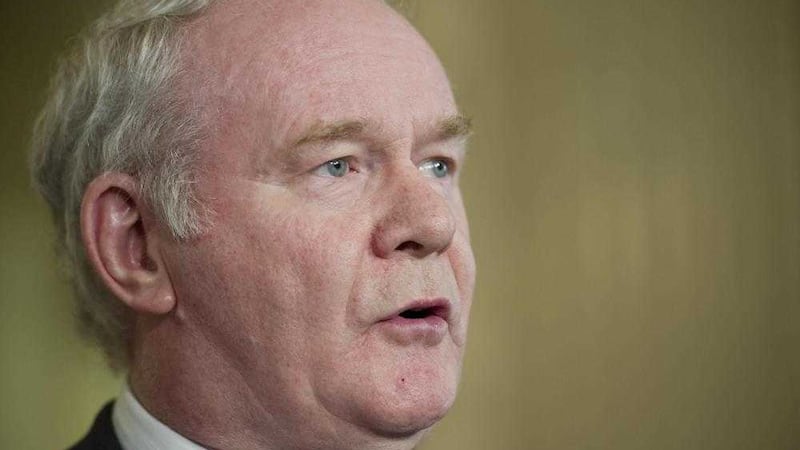THERE were 13 paragraphs in the SDLP leader’s opinion piece published in this paper last week. Bizarrely, 12 of them focused on Sinn Féin, writes Sinn Fein deputy leader Martin McGuinness.
In fact, it was only in the final sentence of his article that he actually chose to concentrate on his own party.
Which is a shame because, if there was ever a party in need of positive leadership, it’s the SDLP.
Instead what was served up was more of the same old lazy SDLP politics: why bother presenting credible policies when we can just attack Sinn Fein?
Who needs to produce workable alternatives when we can just attack Sinn Féin? Why even mention the British government or the unionists when we can just attack Sinn Féin?
Is the SDLP really so bereft of its own ideas that it must constantly define itself by reference to Sinn Féin?
They say a week is a long time in politics but what’s happened to the bright new vision promised by the dynamic young leader just over a fortnight ago?
Because all that we have seen so far from his leadership has been more of the same tired old negative rhetoric.
But of course that’s all part of politics and no amount of mud-slinging from the SDLP is going to deter Sinn Féin from our objectives.
I do feel compelled to put a few facts straight however regarding the ‘Fresh Start’ agreement.
The fact is that the agreement stabilised the power-sharing institutions. It prevented an imminent return to direct rule and all that would mean in terms of unrestrained Tory austerity: unmitigated welfare cuts, water charges, hikes in student fees and an end to free domiciliary care, pensioners' travel and prescriptions.
Instead we negotiated a package of measures including an extra half a billion pounds in new money and also additional flexibilities to invest in public services and the economy.
We agreed that the welfare legislation go through Westminster with the consent of the Assembly but this is simply a technical matter, which saved the Executive £40m.
That £40m will be invested in our public services and, with a sunset clause built in to the legislation, welfare powers will return to Stormont.
The agreement also secured a package of £585 million to support the most vulnerable in our society and low-income working families.
Welfare expert Professor Eileen Evason and her team will now draft proposals on the best way to use this money to provide that support.
The SDLP leader may be happy to hail George Osborne’s decision on tax credits but I suspect a more prudent approach would be to allow Prof Evason to be the judge of how people will be affected by the Tory plans.
After all, it isn’t without good reason that Chancellor Osborne is widely regarded as the master of the stealth tax.
The fact is that the harmonisation of corporation tax on the island of Ireland is expected to generate thousands of new jobs in the north and for an administration that doesn’t yet have full fiscal powers, we have a responsibility to utilise all levers at our disposal that can regenerate our economy and provide employment, opportunity, hope and a reason to stay for our young people.
It is also a fact that legacy issues were not concluded on in the agreement because the British government insisted on a ‘national security’ veto that would have prevented truth being disclosed to the families of victims.
They ruled out any prospect of this being resolved when they rejected reasonable proposals which sought to balance the right to disclosure with their need to protect their national security.
Quite simply, the British government’s intransigent position was not acceptable to victims’ groups and was therefore not acceptable to Sinn Féin.
Nevertheless, we remain absolutely committed to representing the needs of victims and to holding the British government to account for their actions as a main protagonist in the conflict.
In fact, just 24 hours after the conclusion of the agreement, I met with the British Secretary of State and stressed to her the importance of a new process to pick up this work.
Of course, no one is saying the agreement is perfect or that it shouldn’t be scrutinised.
But it also needs to be seen in the context from which it emerged – a backdrop of economic and political crisis created by Tory austerity policies, electoral competition within unionism, and the failure of the British and Irish governments to live up to commitments made in previous agreements.
That is the scenario in which we entered the negotiations and, like all the other parties, Sinn Féin faced a choice. We could either work to do the best deal possible for the people we represent, or we could walk away and content ourselves with sniping from the sidelines.
We chose to do the former because that’s what responsible parties do. That’s what leaders do.
The leader of the SDLP is still new to the job but maybe he’ll learn that soon enough.







